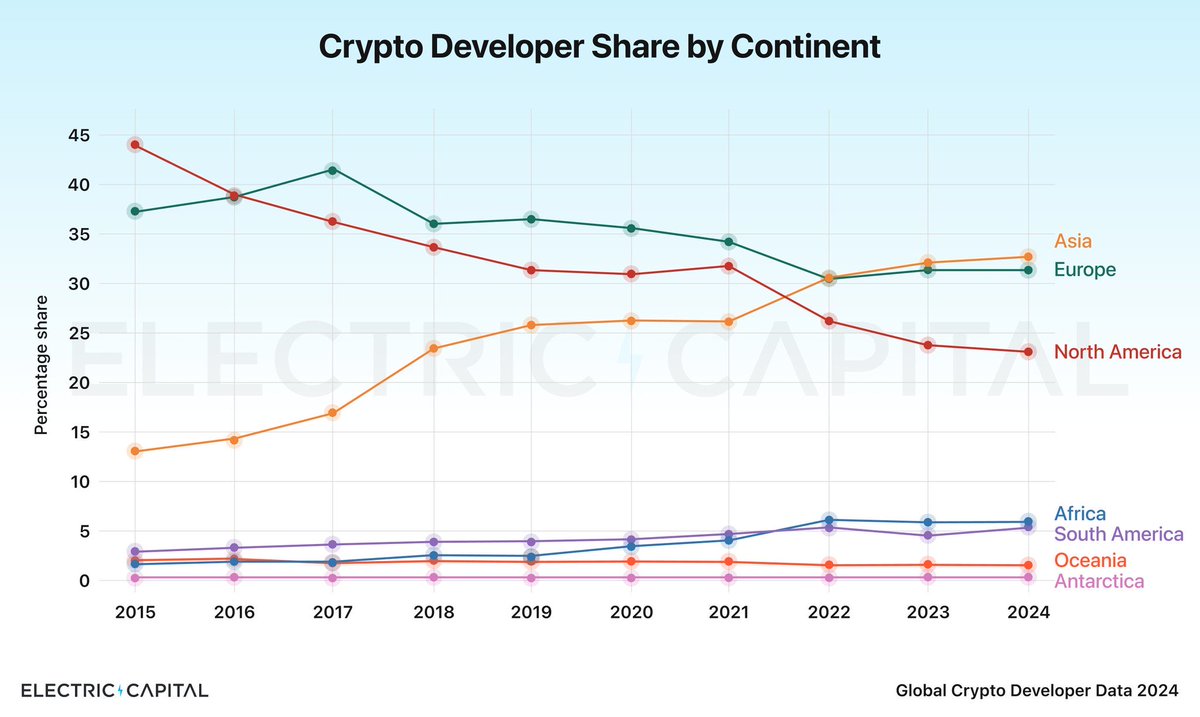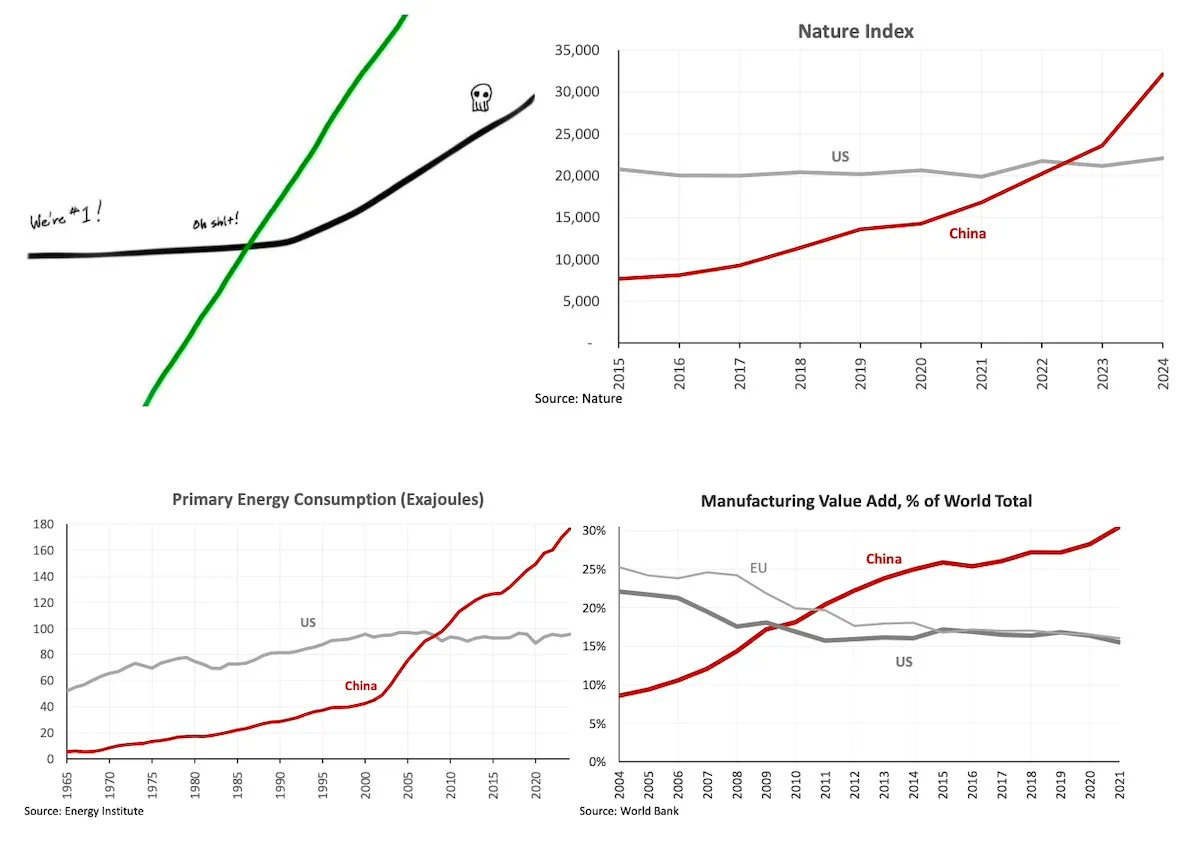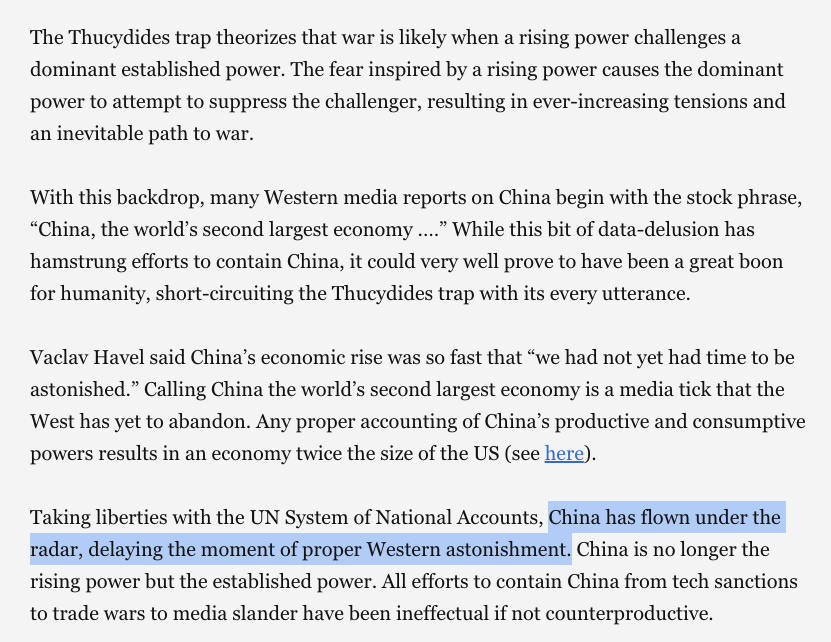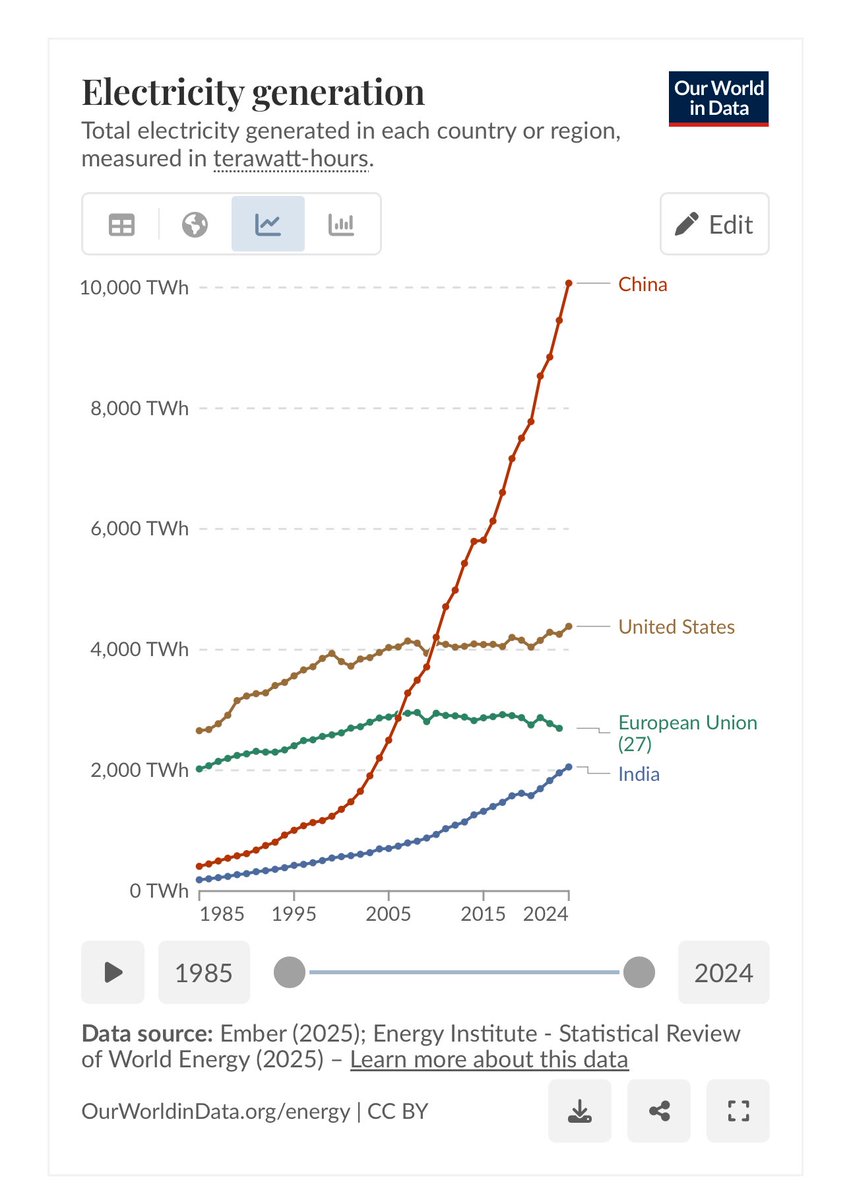Democrats underestimated Republicans, and lost the meme war. Republicans underestimated China, and are unfortunately losing the trade war. And some in China may underestimate the free Internet, where choice can triumph over force.
This requires some explanation. Let's go.
(1) First, as a reality shill, we should stipulate that modern China is perhaps the most physically formidable country to ever exist. Visualize a young Bolo Yeung from Bloodsport. It's #1 in electricity, cars, steel, ships, and countless other industries. No country can realistically win a war against today's China, especially in its own backyard, especially over Taiwan. They can just outbuild everyone else:
(2) And the US on some level now recognizes this. Secretary Hegseth noted on the Shawn Ryan pod that Chinese hypersonics can sink all US aircraft carriers in the first 20 minutes of any Taiwan straits conflict[1]. The CEO of Raytheon admitted[2] the US couldn't practically decouple from China. The former Secretary of the Navy, Carlos del Toro, stated[3] that one Chinese shipyard can produce more ships than the entire US Navy combined. And the Pentagon's own $400M study[4] showed that much of the US military is actually made in China:
(3) This may be why the US is currently effecting a shouting retreat. Even as the military is rebranded to the Department of War, US troops are reportedly[5] being pulled back to actually focus on homeland defense and the war within. And even while there's posting about annexing Greenland and invading Canada, in reality European NATO is being asked to fend for itself. Basically, the words are about expanding American real estate, but the reality is that America is withdrawing from the world:
(4) Now, some will say this isn't a bad thing. After all, America is a republic, not an empire! OK, but the business model of the US is money printing, which is premised on the continuation of global empire. That's because dollar inflation is global taxation, since the inflationary dilution is currently spread across billions of global dollar holders. However...as US troops come back and US tariffs go up, the de facto tax base for dollar inflation shrinks from ~1-3B globally to just 330M Americans. That 67-90% drop in tax base will cause a huge drop in American living standards. We're in the middle of this now; gold and digital gold are smashing all time highs[6], because the dollar is crashing through all-time lows.
(5) Moreover, because the sovereign debt crisis is underway in America, Western Europe, and Japan at the same time, you're seeing a simultaneous fall of all parts of the empire at once. As you can see from the graphs below, yields are high in the US, Germany, Japan, UK, Italy, and France...even as they're falling in China...and even as the world economy has decisively moved to Asia:
(6) So, we are essentially in the midst of the fall of Rome[7]. For the first time in 500+ years, the world's dominant military power is no longer Western. While the shift towards Europe took hundreds of years, the shift back to Asia took just a few decades. It happened so fast that many don't realize that the world economy has already moved back to Asia.
(7) Many Westerners are still in various stages of denial about this fact, or the fact that the US government is insolvent. Elon is our best guy, and gave it his all, and he's already recognized[8] that it's over ("did my best"). But there's still residual romanticism about America's ability to re-industrialize.
(8) In many ways, MAGA still identifies as a manufacturing superpower, and they just don't want to hear that it took 45+ years of grinding in factories for China to get where it is, and that 45% tariffs won't return America overnight to the economy (let alone the demographics) of 1945. There may be a post-dollar path to rebuilding, but it'd be like Russia's post-Soviet path. And the first step in that path would look more like deregulation and special economic zones[9], rather than tariffing away America's access to raw materials and machine tools.
(9) Anyway, I want to skip over the dollar collapse part of all this, because it'll be an unfortunate denouement to what was once the greatest empire of all time. Let's skip ahead to the next question of: what force could possibly rise to balance China after the dollar ends?
(10) Well, after the Roman Empire fell, Christianity endured, and was eventually the seed for civilizational rebirth. Similarly, after the dollar empire ends, the Internet will endure — and could be the seed for civilizational rebirth.
(11) Think of the progression from European Christendom, to the West, to the Internet. Each such shift was a geographical and technological and demographic change[10]...but most of all it was a change in self-understanding.
(12) We already know on some level that the Internet is the most powerful force in the world. It manages 99% of transactions and communications, it's upstream of every politician and election, it controls everything from smart locks to autonomous drones, and it's even in front of your face right now.
(13) Nevertheless, because it's currently[11] intangible, the Internet is still underestimated. The Chinese state does actually get it on some level, which is why they built the Great Firewall as a hard digital border that keeps out foreign ideas (and foreign drones). But post-Maoist China doesn't really have an ideology that's built for export. Chinese nationalism does make intuitive sense to ~1.4B Chinese, so it has sufficient scale to coordinate huge numbers of productive people domestically...but the other 7B+ globally will need something else.
(14) That is: China is a goods exporter, but an idea importer. After all, its three major operating systems of Buddhism, Communism, and Technocapitalism were imported from India, Europe, and America respectively. To be fair, China did fork these operating systems, and made them their own (eg: communism with Chinese characteristics), and China does have an impressive 5000+ year history of arts and literature. But for whatever reason, Chinese culture mainly exports visual vibes (eg TikTok, Hong Kong cinema, glowing cities) rather than verbal ideas.
(15) So, because China doesn't export a conceptual operating system that anyone in the world can adopt and fork, there will be a post-dollar ideological vacuum that's only incompletely filled by a return to nationalism. Many need something higher than the mere earth, and the cloud is something higher. The next Rome, the next Britain, the next America, the next universalist society — that will arise from the Internet, which after all is uniform rule-of-code.
(16) Finally, to @JZ281C's point...these Internet societies cannot and should not physically confront China or (as they put it) interfere in China's internal affairs. Against the Chinese drone armada, you'll still need some residual local deterrence, but the Internet will mainly need to rely on Gandhian non-violence, invisibility, agility, encryption, and decentralization. You just can't take on a superior physical force in the physical world.
(17) Still, because the Internet is intangible it will be underestimated, and this underestimation is itself a strength. The invisibility of the Internet, the dismissibility of it, is the English-compatible version of hide your strength and bide your time. Despite the fact that billions spend much of their waking lives on the Internet, it's still not thought of as the primary organizing principle of their life. This underestimation gives us room for the long rebuild on Internet First[12] principles.
(18) Specifically: the Internet will not be able to take on China in the physical world, but it will generate universalist ideas that appeal to many Chinese (and non-Chinese) people. It will therefore provide many alternative ideologies to Chinese nationalism outside China, whose collective strength may balance (not beat) China.
(19) How does this play out? We could see a billion-person Chinese superstate, and a thousand million-person network states. If one is a vegan village and the second a carnivore community and the third is a biohacker borough, these societies are mutually incompatible with each other. Moreover, their governing ideas can't all be imported into China as their moral premises are different from Chinese nationalism. So these network states become alternatives to China, balances to China, without needing to fight China.
(20) We'll know they're a balance if Chinese nationals voluntarily choose to exit to one of these 1000 startup societies, as an alternative to the 100s of polished Chinese cities. They might do this for much the same reason one chooses a startup over Google: because of the upside, the choice, the variety, the editability.
(21) Yet at the same time the mere existence of these alternative societies around the world wouldn't provoke China. And China wouldn't gain from conquering them, as they'd want to avoid the expensive Roman/British/French/Soviet/American failure mode of endless military intervention. Even if it did conquer some, it couldn't really conquer one thousand, if new startup societies kept popping up every day.
(22) In other words: ideas are upstream of men, code is upstream of drones, private property is private keys, and the keyboard may yet prove on par with the sword. The creation of alternative societies is one model for how the Internet may eventually balance China.



This requires some explanation. Let's go.
(1) First, as a reality shill, we should stipulate that modern China is perhaps the most physically formidable country to ever exist. Visualize a young Bolo Yeung from Bloodsport. It's #1 in electricity, cars, steel, ships, and countless other industries. No country can realistically win a war against today's China, especially in its own backyard, especially over Taiwan. They can just outbuild everyone else:
(2) And the US on some level now recognizes this. Secretary Hegseth noted on the Shawn Ryan pod that Chinese hypersonics can sink all US aircraft carriers in the first 20 minutes of any Taiwan straits conflict[1]. The CEO of Raytheon admitted[2] the US couldn't practically decouple from China. The former Secretary of the Navy, Carlos del Toro, stated[3] that one Chinese shipyard can produce more ships than the entire US Navy combined. And the Pentagon's own $400M study[4] showed that much of the US military is actually made in China:
(3) This may be why the US is currently effecting a shouting retreat. Even as the military is rebranded to the Department of War, US troops are reportedly[5] being pulled back to actually focus on homeland defense and the war within. And even while there's posting about annexing Greenland and invading Canada, in reality European NATO is being asked to fend for itself. Basically, the words are about expanding American real estate, but the reality is that America is withdrawing from the world:
(4) Now, some will say this isn't a bad thing. After all, America is a republic, not an empire! OK, but the business model of the US is money printing, which is premised on the continuation of global empire. That's because dollar inflation is global taxation, since the inflationary dilution is currently spread across billions of global dollar holders. However...as US troops come back and US tariffs go up, the de facto tax base for dollar inflation shrinks from ~1-3B globally to just 330M Americans. That 67-90% drop in tax base will cause a huge drop in American living standards. We're in the middle of this now; gold and digital gold are smashing all time highs[6], because the dollar is crashing through all-time lows.
(5) Moreover, because the sovereign debt crisis is underway in America, Western Europe, and Japan at the same time, you're seeing a simultaneous fall of all parts of the empire at once. As you can see from the graphs below, yields are high in the US, Germany, Japan, UK, Italy, and France...even as they're falling in China...and even as the world economy has decisively moved to Asia:
(6) So, we are essentially in the midst of the fall of Rome[7]. For the first time in 500+ years, the world's dominant military power is no longer Western. While the shift towards Europe took hundreds of years, the shift back to Asia took just a few decades. It happened so fast that many don't realize that the world economy has already moved back to Asia.
(7) Many Westerners are still in various stages of denial about this fact, or the fact that the US government is insolvent. Elon is our best guy, and gave it his all, and he's already recognized[8] that it's over ("did my best"). But there's still residual romanticism about America's ability to re-industrialize.
(8) In many ways, MAGA still identifies as a manufacturing superpower, and they just don't want to hear that it took 45+ years of grinding in factories for China to get where it is, and that 45% tariffs won't return America overnight to the economy (let alone the demographics) of 1945. There may be a post-dollar path to rebuilding, but it'd be like Russia's post-Soviet path. And the first step in that path would look more like deregulation and special economic zones[9], rather than tariffing away America's access to raw materials and machine tools.
(9) Anyway, I want to skip over the dollar collapse part of all this, because it'll be an unfortunate denouement to what was once the greatest empire of all time. Let's skip ahead to the next question of: what force could possibly rise to balance China after the dollar ends?
(10) Well, after the Roman Empire fell, Christianity endured, and was eventually the seed for civilizational rebirth. Similarly, after the dollar empire ends, the Internet will endure — and could be the seed for civilizational rebirth.
(11) Think of the progression from European Christendom, to the West, to the Internet. Each such shift was a geographical and technological and demographic change[10]...but most of all it was a change in self-understanding.
(12) We already know on some level that the Internet is the most powerful force in the world. It manages 99% of transactions and communications, it's upstream of every politician and election, it controls everything from smart locks to autonomous drones, and it's even in front of your face right now.
(13) Nevertheless, because it's currently[11] intangible, the Internet is still underestimated. The Chinese state does actually get it on some level, which is why they built the Great Firewall as a hard digital border that keeps out foreign ideas (and foreign drones). But post-Maoist China doesn't really have an ideology that's built for export. Chinese nationalism does make intuitive sense to ~1.4B Chinese, so it has sufficient scale to coordinate huge numbers of productive people domestically...but the other 7B+ globally will need something else.
(14) That is: China is a goods exporter, but an idea importer. After all, its three major operating systems of Buddhism, Communism, and Technocapitalism were imported from India, Europe, and America respectively. To be fair, China did fork these operating systems, and made them their own (eg: communism with Chinese characteristics), and China does have an impressive 5000+ year history of arts and literature. But for whatever reason, Chinese culture mainly exports visual vibes (eg TikTok, Hong Kong cinema, glowing cities) rather than verbal ideas.
(15) So, because China doesn't export a conceptual operating system that anyone in the world can adopt and fork, there will be a post-dollar ideological vacuum that's only incompletely filled by a return to nationalism. Many need something higher than the mere earth, and the cloud is something higher. The next Rome, the next Britain, the next America, the next universalist society — that will arise from the Internet, which after all is uniform rule-of-code.
(16) Finally, to @JZ281C's point...these Internet societies cannot and should not physically confront China or (as they put it) interfere in China's internal affairs. Against the Chinese drone armada, you'll still need some residual local deterrence, but the Internet will mainly need to rely on Gandhian non-violence, invisibility, agility, encryption, and decentralization. You just can't take on a superior physical force in the physical world.
(17) Still, because the Internet is intangible it will be underestimated, and this underestimation is itself a strength. The invisibility of the Internet, the dismissibility of it, is the English-compatible version of hide your strength and bide your time. Despite the fact that billions spend much of their waking lives on the Internet, it's still not thought of as the primary organizing principle of their life. This underestimation gives us room for the long rebuild on Internet First[12] principles.
(18) Specifically: the Internet will not be able to take on China in the physical world, but it will generate universalist ideas that appeal to many Chinese (and non-Chinese) people. It will therefore provide many alternative ideologies to Chinese nationalism outside China, whose collective strength may balance (not beat) China.
(19) How does this play out? We could see a billion-person Chinese superstate, and a thousand million-person network states. If one is a vegan village and the second a carnivore community and the third is a biohacker borough, these societies are mutually incompatible with each other. Moreover, their governing ideas can't all be imported into China as their moral premises are different from Chinese nationalism. So these network states become alternatives to China, balances to China, without needing to fight China.
(20) We'll know they're a balance if Chinese nationals voluntarily choose to exit to one of these 1000 startup societies, as an alternative to the 100s of polished Chinese cities. They might do this for much the same reason one chooses a startup over Google: because of the upside, the choice, the variety, the editability.
(21) Yet at the same time the mere existence of these alternative societies around the world wouldn't provoke China. And China wouldn't gain from conquering them, as they'd want to avoid the expensive Roman/British/French/Soviet/American failure mode of endless military intervention. Even if it did conquer some, it couldn't really conquer one thousand, if new startup societies kept popping up every day.
(22) In other words: ideas are upstream of men, code is upstream of drones, private property is private keys, and the keyboard may yet prove on par with the sword. The creation of alternative societies is one model for how the Internet may eventually balance China.

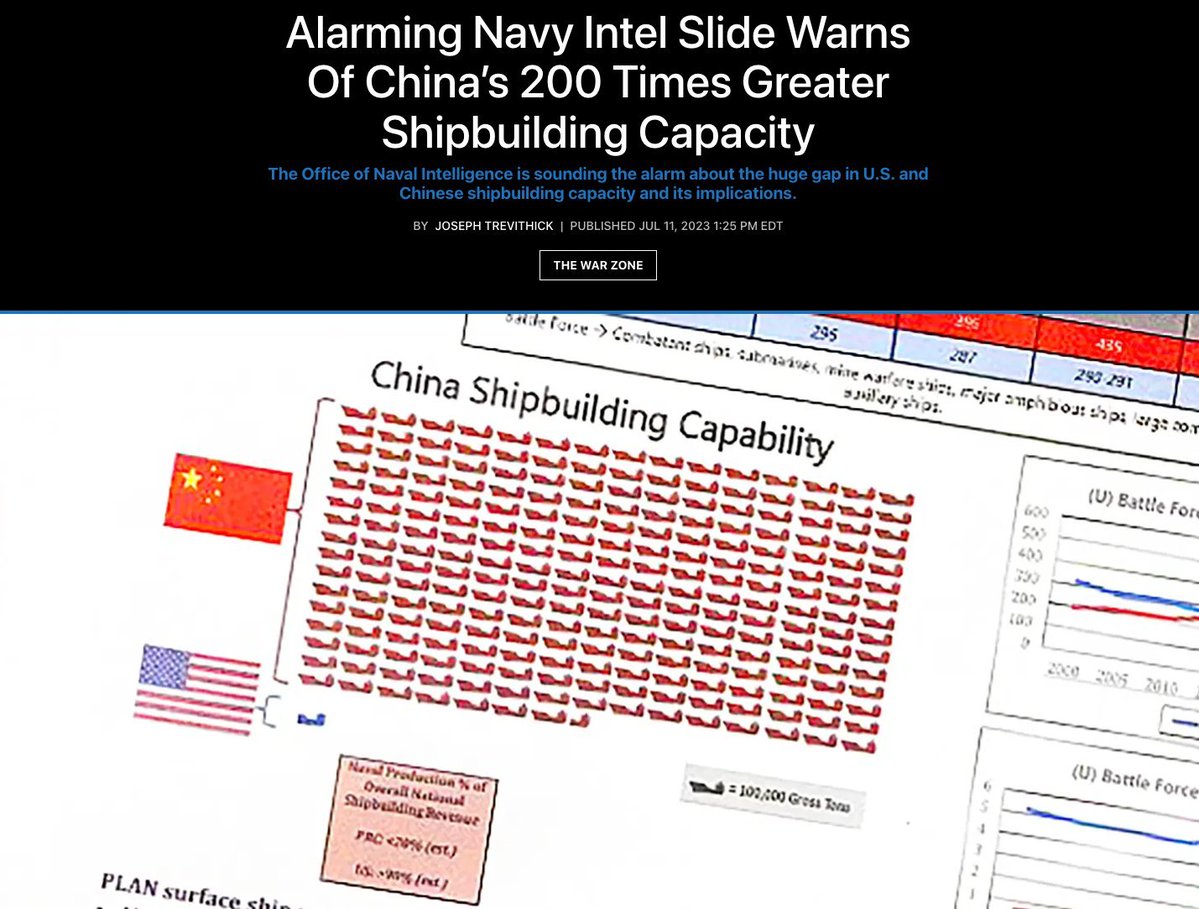


One thing I want to stress: this is the Flight 93 Administration.
What that means is: many in the administration really are smart, well-intentioned men who managed to rush the cockpit against all odds, take control of the plane from abolish-the-police ideological terrorists, and are now trying to avert a crash landing. Some also do get how difficult the strategic situation vs China and the debt and so on is.
But if you look at the numbers, the plane's relative descent has been going on for decades and is now likely irreversible:
Even this relative descent might not be the end of the world if the US exported tomatoes and cars. However, it mainly exports dollars. And the issuer of the global reserve currency can't tolerate a gradual decline, because losing money printing ability will mean an Argentina-like tumble to something like the #50 spot rather than a graceful descent to #2.
That's what underpins the push to retain or even expand empire, a push that is now nearing the end of the line. For obvious reasons, the American public doesn't really want to hear this kind of truth, and it's also not obvious that saying it would help.
Anyway: I'm not constrained in that way, so I can speak the truth as I see it. I may of course be wrong, but citations follow.
CITATIONS
[1]: Clip of Hegseth on the Shawn Ryan pod before he became Secretary: "If 15 [Chinese] hypersonic missiles can take out our ten aircraft carriers in the first 20 minutes of a conflict, what does that look like?"
youtube.com/shorts/tetPM-R…
[2]: Video of Raytheon CEO explaining that they can't decouple from China:
x.com/balajis/status…
[3]: Clip of former US Secretary of the Navy Carlos Del Toro noting that one Chinese shipyard has more shipbuilding capacity than the entire US Navy combined:
x.com/balajis/status…
[4]: Pentagon-commissioned Govini study showing that the US military is made in China: x.com/balajis/status…
[5]: Pentagon is reportedly withdrawing from China to focus on the Western hemisphere:
x.com/balajis/status…
[5b]: See also @DoggyDog1208 on how China may have scaled so fast that it obviated the Thucydides trap: x.com/balajis/status…
[6]: Dollar inflation is global taxation:
x.com/balajis/status…
Yields up, gold and digital gold at all time highs:
x.com/balajis/status…
[7]: Graph from @LukeGromen showing the debasement of the Roman denarius vs the debasement of the American dollar:
[8]: Elon is our best guy, and went all in, and concluded that he did his best. He further noted on the All-In Pod that the US government is simply beyond fixing:
x.com/elonmusk/statu…
If you combine his notes with Dalio, Turchin, the Sovereign Individual, the Fourth Turning, and frankly dozens of other commentators at this point...what emerges isthat something comparable to the end of the USSR is approaching, a national insolvency.
[9]: I wrote a piece on an Internet-native version of the special economic zone, the Special Elon Zone. Essentially, take some abandoned piece of land, keep most of the laws, but sunset select old regulations so that we can build at the speed of physics not permits:
x.com/balajis/status…
[10]: Here's a bit more on the shift from Christendom to the West, which will be comparably important to the shift from the West to the Internet. It isn't just the American dollar decentralizing to the Internet via Bitcoin, but American society.
x.com/balajis/status…
[11]: The Internet is currently intangible, but it won't always be so. See this post on how popups are the new startups:
balajis.com/p/popups-are-t…
[12]: The concept of "Internet First" is simultaneously a play on words of "America First" but also "mobile first". It's a technopolitical strategy. It observes that the Internet is the first thing you check in the morning, and the first place you go for your transactions and your communications, and actually also the first place for ostensibly Nation First political movements.
The logic is that ultimately the Internet will come from the background to the foreground, and that 21st century ideologies will be built explicitly on Internet First grounds.
Or as Larry Page put it, "If you look at the different kinds of laws we make, they're very old. The laws when we went public we're 50 years old...A law can't [necessarily] be right if it's 50 years old, like it's before the Internet, that's a pretty major change."
x.com/balajis/status…


What that means is: many in the administration really are smart, well-intentioned men who managed to rush the cockpit against all odds, take control of the plane from abolish-the-police ideological terrorists, and are now trying to avert a crash landing. Some also do get how difficult the strategic situation vs China and the debt and so on is.
But if you look at the numbers, the plane's relative descent has been going on for decades and is now likely irreversible:
Even this relative descent might not be the end of the world if the US exported tomatoes and cars. However, it mainly exports dollars. And the issuer of the global reserve currency can't tolerate a gradual decline, because losing money printing ability will mean an Argentina-like tumble to something like the #50 spot rather than a graceful descent to #2.
That's what underpins the push to retain or even expand empire, a push that is now nearing the end of the line. For obvious reasons, the American public doesn't really want to hear this kind of truth, and it's also not obvious that saying it would help.
Anyway: I'm not constrained in that way, so I can speak the truth as I see it. I may of course be wrong, but citations follow.
CITATIONS
[1]: Clip of Hegseth on the Shawn Ryan pod before he became Secretary: "If 15 [Chinese] hypersonic missiles can take out our ten aircraft carriers in the first 20 minutes of a conflict, what does that look like?"
youtube.com/shorts/tetPM-R…
[2]: Video of Raytheon CEO explaining that they can't decouple from China:
x.com/balajis/status…
[3]: Clip of former US Secretary of the Navy Carlos Del Toro noting that one Chinese shipyard has more shipbuilding capacity than the entire US Navy combined:
x.com/balajis/status…
[4]: Pentagon-commissioned Govini study showing that the US military is made in China: x.com/balajis/status…
[5]: Pentagon is reportedly withdrawing from China to focus on the Western hemisphere:
x.com/balajis/status…
[5b]: See also @DoggyDog1208 on how China may have scaled so fast that it obviated the Thucydides trap: x.com/balajis/status…
[6]: Dollar inflation is global taxation:
x.com/balajis/status…
Yields up, gold and digital gold at all time highs:
x.com/balajis/status…
[7]: Graph from @LukeGromen showing the debasement of the Roman denarius vs the debasement of the American dollar:
[8]: Elon is our best guy, and went all in, and concluded that he did his best. He further noted on the All-In Pod that the US government is simply beyond fixing:
x.com/elonmusk/statu…
If you combine his notes with Dalio, Turchin, the Sovereign Individual, the Fourth Turning, and frankly dozens of other commentators at this point...what emerges isthat something comparable to the end of the USSR is approaching, a national insolvency.
[9]: I wrote a piece on an Internet-native version of the special economic zone, the Special Elon Zone. Essentially, take some abandoned piece of land, keep most of the laws, but sunset select old regulations so that we can build at the speed of physics not permits:
x.com/balajis/status…
[10]: Here's a bit more on the shift from Christendom to the West, which will be comparably important to the shift from the West to the Internet. It isn't just the American dollar decentralizing to the Internet via Bitcoin, but American society.
x.com/balajis/status…
[11]: The Internet is currently intangible, but it won't always be so. See this post on how popups are the new startups:
balajis.com/p/popups-are-t…
[12]: The concept of "Internet First" is simultaneously a play on words of "America First" but also "mobile first". It's a technopolitical strategy. It observes that the Internet is the first thing you check in the morning, and the first place you go for your transactions and your communications, and actually also the first place for ostensibly Nation First political movements.
The logic is that ultimately the Internet will come from the background to the foreground, and that 21st century ideologies will be built explicitly on Internet First grounds.
Or as Larry Page put it, "If you look at the different kinds of laws we make, they're very old. The laws when we went public we're 50 years old...A law can't [necessarily] be right if it's 50 years old, like it's before the Internet, that's a pretty major change."
x.com/balajis/status…
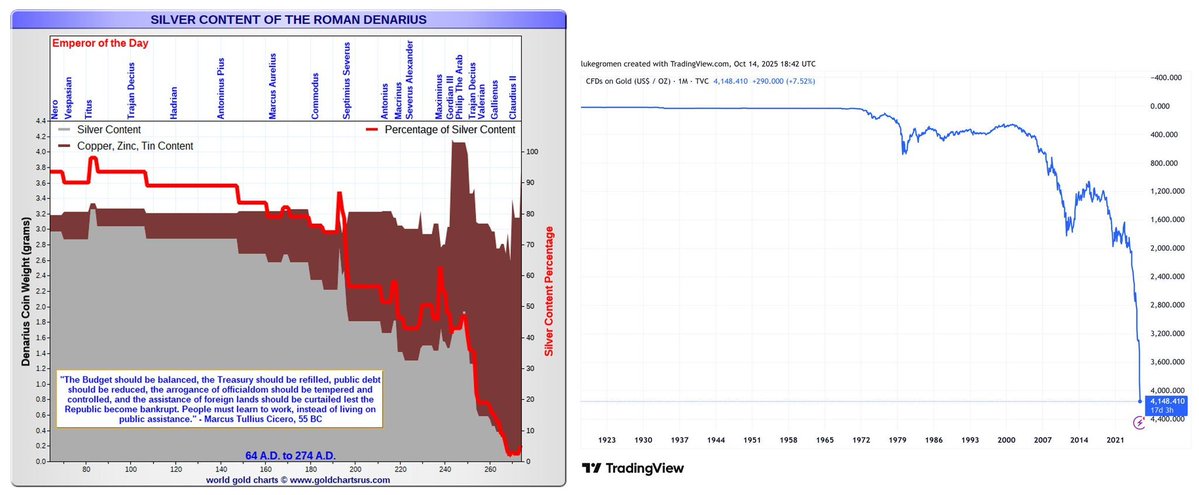
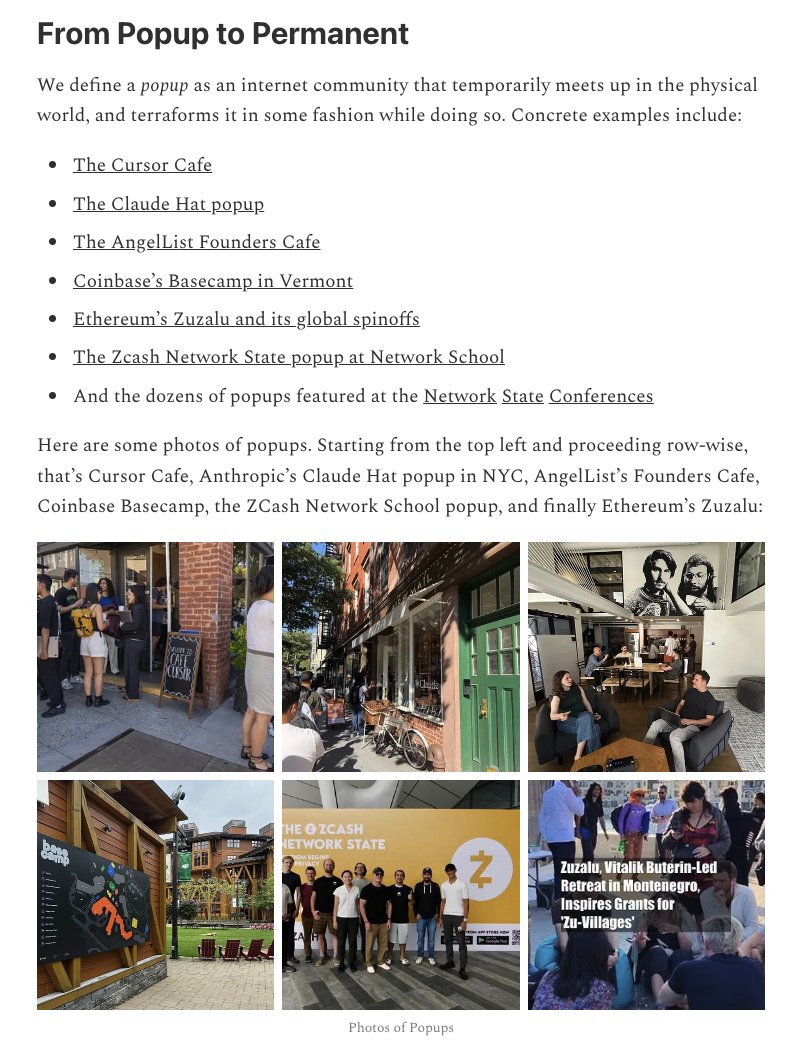

When all else goes down, the Internet stays up. So, after a catastrophe, we restore from cloud.
We're actually already used to this idea, and even have icons for it. We just need to scale it up from individuals to communities. Bitcoin is like v1 of that.

We're actually already used to this idea, and even have icons for it. We just need to scale it up from individuals to communities. Bitcoin is like v1 of that.
https://x.com/yishan/status/1979140010772459783

• • •
Missing some Tweet in this thread? You can try to
force a refresh



